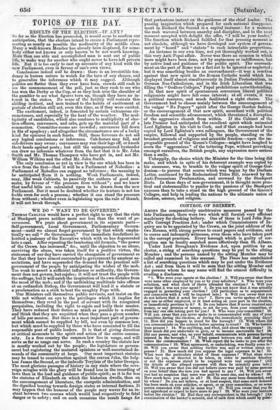TOPICS OF THE DAY.
B.ESULTS OF THE ELECTION—IF ANY?
So far as the Election has proceeded, it would seem to confirm our anticipation, that the electors intend to create a Parliament repre- senting as nearly as possible the mediocrity of the middle class. Many a well-known Member has already been displaced, for some- body either not known or only known to be not worth knowing. More than one able and accomplished man is sent out of public life, to make way for another who ought never to have left private life. But it is too early to cast up accounts of any kind with the new Parliament, even in favour of one's own views. Conclusions indeed will be drawn : there is an irresistible ten- dency in human nature to watch for the tarn of any chance, and to generalize the inferences which it may. suggest. Although politics are flatter than they ever have been, crowds still rush to - see the commencement of the poll, just as they rush to see who has won the Derby or the Cup, or as they look over the shoulder of the gambler to see what figures turn up, though they have no in- terest in the stakes. No sense of the futility will restrain this abiding instinct, and men trained to the habits of excitement at periods of election still act, even this time, as if they were excited.
The excitement, indeed, is fomented by certain extraneous cir- cumstances, and especially by the heat of the weather. The mill- - tiplicity of candidates, which also conduces to multiplicity of elec- tion-officers, canvassers, and cabs, gets up the material part of a commotion. Committee-rooms are crowded ; canvassers fall down in fits of apoplexy ; and altogether the circumstances are of a lucky kind for epicures in such feasts. Still, these fervours do not aid any logical conclusions or inferences. Cab-horses may fall, and cab-drivers may swear; canvassers may run their legs off, or knock their heads against posts ; but still the unimpassioned bystander can draw no inference whatever from the fact that it is Mr. Sohn Smith and Mr. Thomas Thompson who have got in, and not Mr. William Wilkins and the other Mr. John Smith.
The only conclusion as yet in -view is the one which has been in view from the first—that it will be a Parliament of Nobodies : a Parliament of /iebodies can suggest no inference ; the meaning to be anticipated -from it is nothing. Weak Parliaments, indeed, may, like weak Cabinets, be passively the authors of good mea- sures, by favour of "the pressure from without"; and we know that useful bills are calculated upon to be drawn from the new Parliament. But it must be doubted whether its texture is not too feeble even for such a process; whether it can stand the pressure from without ; whether even in legislating upon the rule of thumb, it will not break through.


























 Previous page
Previous page